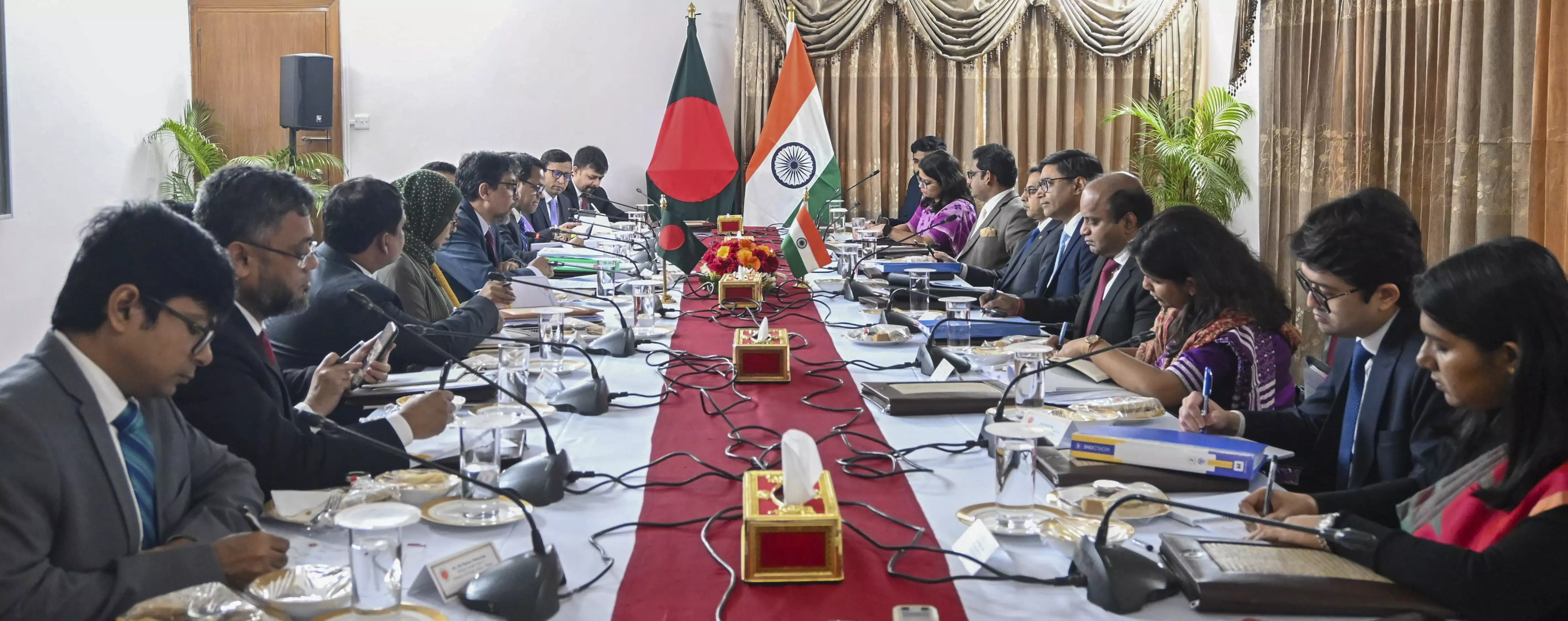
Indian Foreign Secretary Vikram Misri with his Bangaldeshi counterpart Mohammad Jashim Uddin and other delegates in Dhaka on Monday (Dec 9). Photo: PTI
‘Conveyed our concerns about safety of minorities’: Foreign Secretary Misri in Dhaka
Both sides exchanged views on sub-regional, regional and multilateral issues, and agreed to enhance consultations and cooperation to advance regional integration

India raised its concerns over the safety of minorities in Bangladesh, flagging "regrettable incidents of attacks on cultural, religious and diplomatic properties" as Foreign Secretary Vikram Misri met his counterpart in Dhaka on Monday (December 9).
Misri, the first high-level Indian official to visit Bangladesh after August 5 when prime minister Sheikh Hasina fled to India following massive protests against her government, expressed New Delhi's desire for a "positive, constructive and mutually beneficial" relationship with Dhaka.
‘Frank, constructive exchange of views’
"Today's discussions have given both of us the opportunity to take stock of our relations. I appreciate the opportunity today to have had a frank, candid and constructive exchange of views with all my interlocutors," Misri told reporters after meeting Foreign Secretary Mohammad Jashim Uddin.
"I emphasised that India desires a positive, constructive and mutually beneficial relationship with Bangladesh," he said.
Misri said they discussed "certain recent developments and issues."
Also Read: Diplomats worry as India-Bangladesh ties, once solidly glued, unravel
"I conveyed our concerns, including those related to the safety and welfare of minorities. We also discussed some regrettable incidents of attacks on cultural, religious and diplomatic properties," Misri told reporters.
He said India expected an overall constructive approach on all these issues by the Bangladesh authorities and looked forward to moving the relationship forward in a positive and constructive direction.
Misri said he underlined India's desire to work closely with the interim government of Bangladesh.
Misri met Muhammad Yunus
He also called on Interim Government Chief Adviser Muhammad Yunus and Foreign Affairs Adviser Md. Touhid Hossain.
During these meetings, Misri highlighted India's support for a democratic, stable, peaceful, progressive, and inclusive Bangladesh, said a statement issued by the Ministry of External Affairs (MEA) in New Delhi.
Also Read: Bangladesh | Case lodged against Chinmoy Krishna Das, his followers in Chittagong
"He reiterated India's willingness to build a positive and constructive relationship with Bangladesh, based on mutual trust and respect and mutual sensitivity to each other’s concerns and interests," it said.
“People are main stakeholders’
Misri emphasised that people are the main stakeholders in India-Bangladesh relations, and noted that India’s development cooperation and multifaceted engagements with Bangladesh, including in the areas of connectivity, trade, power, energy, and capacity building, are all geared towards the benefit of the people of Bangladesh.
"We have always seen in the past, and we continue to see in the future this relationship as a people-centric and people-oriented relationship; one that has the benefits of all the people as its central motivational force," he said.
Also Read: From Capitol Hill to Dhaka: The fragile state of democracy in 2024
Misri said the relationship was reflected on a daily basis, in the development projects executed on the ground with Indian assistance and reflected in mutually-beneficial engagements in areas including trade, commerce, connectivity, water, and energy.
‘No reason for disruption of ties’
He said Delhi found no reason for disruption of the ties with Bangladesh’s August political change.
"Since the political changes in Bangladesh in August this year, there have, of course, been contacts between our leaderships. The Prime Minister (Narendra Modi) was the first world leader to greet the chief adviser on his assumption of office," he said.
"They had a very cordial telephonic discussion.”
Comprehensive discussions
During the Foreign Office consultations, both sides held comprehensive discussions on a wide range of issues covering political and security matters, border management, trade, commerce and connectivity, cooperation in water, power and energy sectors, development cooperation, consular, cultural and people-to-people ties, the MEA said.
They also exchanged views on sub-regional, regional and multilateral issues, and agreed to enhance consultations and cooperation to advance regional integration, including under the BIMSTEC framework.
"Foreign Secretary’s visit will help in sustaining bilateral engagement between India and Bangladesh with a view to addressing concerns as well as advancing the substantive issues in the relationship," it said.
Also Read: India on alert as Bangladesh deploys Turkey-made drones on border: Report
The close ties between India and Bangladesh came under severe strain after Hasina was forced to leave the country in the face of a massive anti-government protest in August. Nobel Peace laureate Mohammad Yunus came to power days after Hasina fled to India.
The relations deteriorated further in recent weeks over attacks on Hindus and the arrest of Hindu monk Chinmoy Krishna Das.
There has been a spate of incidents of violence against Hindus and other minorities, as well as attacks on temples in Bangladesh in the last few weeks that triggered strong concerns in New Delhi.
Analysts speculated that recent incidents, including the arrest of the Hindu monk in Bangladesh, the alleged harassment of the minority community, and attacks on Hindu temples in Bangladesh, and the attack on the Bangladesh mission in Agartala are likely to figure in the FS-level talks.
Interim government head Yunus earlier said India might not have liked the “revolution” ousting a “fascist regime”. Members of his interim Cabinet said the Indian media was largely exaggerating the harassment of minorities.
Also Read: Yunus govt hasn’t made minorities feel safe, but Hindus need course correction too
Dhaka said the sporadic violence was a manifestation of an outburst of anger against the leaders and activists of the ousted Hasina regime and the Hindus who were harassed were related to her Awami League party and the violence had nothing to do with their religious faith.
In September, foreign affairs adviser Mohammad Touhid Hossain met briefly with his Indian counterpart S Jaishankar in New York on the sidelines of a UN general assembly meeting.
(With agency inputs)

